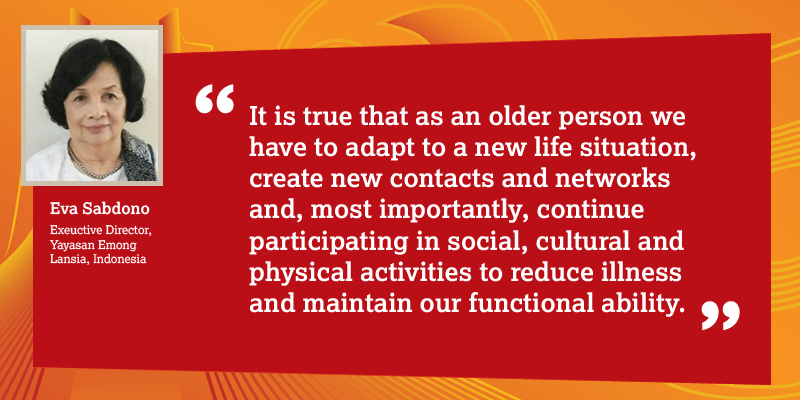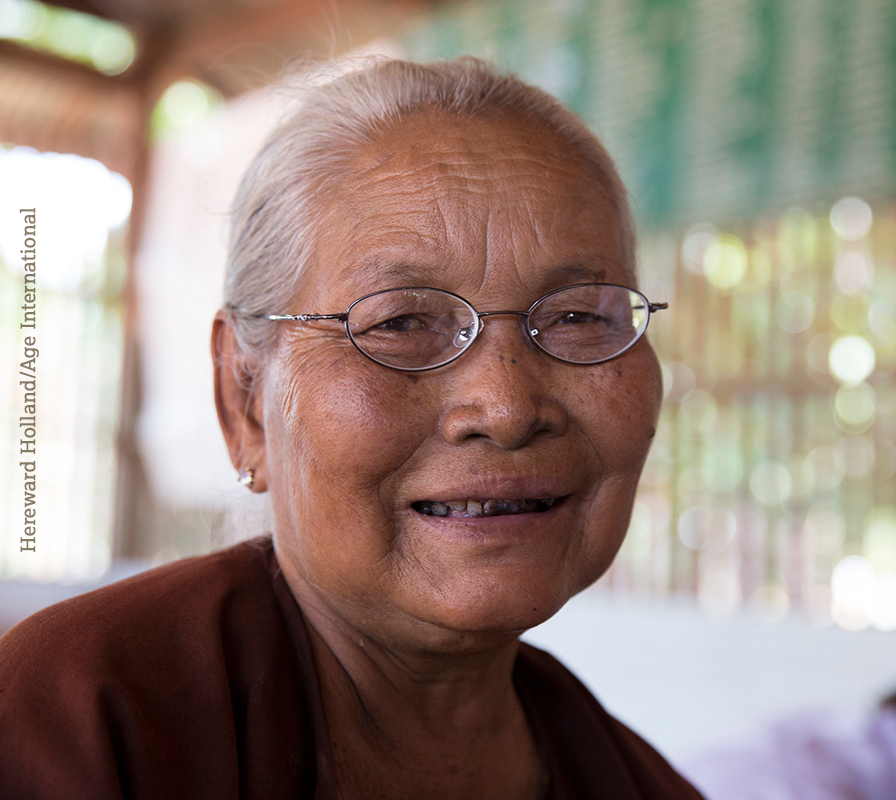
How do you perceive the eff ects of changing family structure on older people and communities in Indonesia?
Indonesia, like most societies across Asia, is experiencing a shift from an extended family structure to a nuclear family, due to demographic changes. The reduced family structures do not have too big an impact on the socio-economic condition of the older persons due to the prevalence of spiritual beliefs and Indonesia’s culture of mutual support (gotong royong). This culture is still strong in the way that families and communities care for their older parents or neighbours, especially in rural areas.
Older persons in Indonesia in general prefer to be independent, and most often they do not want to ask for help from their children or the community. They take care not only of themselves, but also of members of their immediate family, whether they are living in an extended family household, just with their spouse or even when living alone. They prefer to live in their own home and familiar surroundings as long as possible. It is only when they become ill, frail, experience non-communicable diseases, or are unable to perform activities of daily living by themselves, that they become dependent on others.
How can older people themselves, as well as their family and communities, prepare to handle the challenges of population ageing?
The challenges and implications of ageing have been considered in the development agenda of our government, researchers and the community at large for the last two decades, especially since the Year of Older Persons in 1999, followed by the Global Commitment on Ageing made in the Madrid International Plan on Ageing, and WHO’s recommendations on healthy ageing, active ageing, and an age-friendly environment. There has been a shift from thinking that older persons are always dependent to a belief that older persons can and should be active participants in the development of their own wellbeing and in the wellbeing of their families and their communities.
Is there room for the private sector to address those challenges and how?
It is now understood by all stakeholders concerned, including the private sector, that efforts to improve the quality of life of older persons in a sustainable way should be comprehensive and adopt the basic rights approach. The private sector has a big role in meeting the needs of older persons through the provision of an age-friendly environment, age-friendly housing, age-friendly transportation, information on health trends and social contacts for older people as well as the development of age-friendly food consumption, bearing in mind the challenges faced when people grow older.
How would you expect communities and the government to support older people to lead an autonomous and independent life?
Being old is not synonymous with being lonely or sick. Being an older person myself, I realize that our lifestyle while we were under-fives, growing up as teenagers, becoming adults and receiving education and guidance from our parents, teachers and the social environment while growing up, all have a big impact on our physical and mental health when we reach old age. It is true that as an older person we have to adapt to a new life situation, create new contacts and networks and, most important, continue participating in social, cultural and physical activities to reduce illness and maintain our functional ability. Age is just a number, and self-determination as well as doing one’s best to stay healthy and active really pays off in later life.
You have been involved in the development of several national policies related to population ageing. What do you fi nd pleasing and what is missing in those policies?
Being involved for more than 20 years with advocating on ageing issues, campaigning for better policies and programmes with the government, I am glad to say that Indonesia has made a lot of progress in developing and implementing policies and programmes to improve the quality of life of older persons, not just for the underprivileged but for everyone. In 2014, Indonesia launched the Universal Health Care Program, and in 2015 it launched the National Social Security Program for all workers, both formal and non-formal.
The 2019–2024 National Strategy on the Wellbeing of Older Persons, still under process, is a coordinative guideline for all related stakeholders in facing the challenges and implications of ageing. It shows the serious commitment of our government to provide policies and programmes that will improve the quality of life of its citizens throughout the course of life, with benefits for people of all ages.
What is still missing is a legal binding document to ensure the implementations of all policies and programmes in a sustainable way. A UN Convention on the Rights of Older Persons ratified by our government is badly needed.

